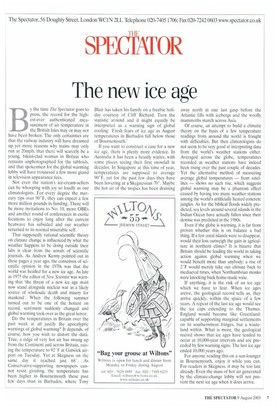SPECTATOR
The new ice age
By the time The Spectator goes to press, the record for the highest-ever authenticated measurement of air temperature in the British Isles may or may not have been broken. The only certainties are that the railway industry will have dreamed up yet more reasons why trains may only run at 20mph, that there will scarcely be a young, bikini-clad woman in Britain who remains unphotographed for the tabloids, and that spokesmen for the global warming lobby will have trousered a few more grand in television appearance fees.
Not even the nation's ice-cream-sellers can be whooping with joy so loudly as our climatologists. For every degree the mercury tips over 90°F, they can expect a few more million pounds in funding. There will be more invitations to No. 10, more OBEs and another round of conferences in exotic locations to enjoy long after the current heatwave has subsided and our weather returned to its normal miserable self.
That supposedly rational scientific theory on climate change is influenced by what the weather happens to be doing outside their labs is clear from the annals of scientific journals. As Andrew Kenny pointed out in these pages a year ago, the consensus of scientific opinion in the 1970s was that the world was headed for a new ice age. As late as 1975 the editor of New Scientist was warning that the threat of a new ice age must now stand alongside nuclear war as a likely source of wholesale death and misery for mankind'. When the following summer turned out to be one of the hottest on record, sentiment suddenly changed and global warming took over as the great terror.
Do the temperatures in Britain over the past week at all justify the apocalyptic warnings of global warming? It depends, of course, how you wish to distort the data. True, a ridge of very hot air has swung up from the Continent and across Britain, raising the temperature to 92°F at Gatwick airport on Tuesday. Yet at Skegness on the same day it reached just 68 ° . As Conservative-supporting newspapers cannot resist gloating, the temperature has been higher in Bournemouth these past few days than in Barbados, where Tony Blair has taken his family on a freebie holiday courtesy of Cliff Richard. Turn the statistic around and it might equally be interpreted as a warning sign of global cooling: 'Fresh fears of ice age as August temperatures in Barbados fall below those of Bournemouth.'
If you want to construct a case for a new ice age, there is plenty more evidence. In Australia it has been a beastly winter, with some places seeing their first snowfall in decades. In Singapore at this time of year, temperatures are supposed to average 90°F, yet for the past few days they have been hovering at a Skegnessian 70°. Maybe the hot air of the tropics has been draining away north in one last gasp before the Atlantic fills with icebergs and the woolly mammoths march across Asia.
Of course, an attempt to build a climatic theory on the basis of a few temperature readings from around the world is fraught with difficulties. But then climatologists do not seem to be very good at interpreting data from the world's weather stations either. Averaged across the globe, temperatures recorded at weather stations have indeed been rising over the past couple of decades. Yet the alternative method of measuring average global temperatures — from satellites — shows no such rise, which suggests global warming may be a phantom effect caused by having too many weather stations among the world's artificially heated concrete jungles. As for the biblical floods widely predicted, sea levels around several islands in the Indian Ocean have actually fallen since their demise was predicted in the 1980s.
Even if the globe is warming, it is far from proven whether this is on balance a bad thing. If a few coral islands were to disappear, would their loss outweigh the gain in agriculture in northern climes? It is bizarre that Britain should be leading the world in taking action against global warming when we would benefit more than anybody: a rise of 2°F would merely take our climate back to mediaeval times, when Northumbrian monks were knocking back home-made wine.
If anything, it is the risk of an ice age which we have to fear. When ice ages arrive, the geological record tells us, they arrive quickly, within the space of a few years. A repeat of the last ice age would see the ice caps extending to the Thames. England would become like Greenland: capable of supporting marginal settlements on its southernmost fringes, but a wasteland within. What is more, the geological record shows that ice ages have tended to occur at 10,000-year intervals and are preceded by few warning signs. The last ice age ended 10,000 years ago.
For anyone reading this on a sun-lounger in Bournemouth, enjoy it while you can. For readers in Skegness, it may be too late already. Even the mass of hot air generated by the climate-change lobby will not prevent the next ice age when it does arrive.


































































 Previous page
Previous page